- Home
- Juliet Marillier
A Dance with Fate Page 9
A Dance with Fate Read online
Page 9
I make myself breathe. I’m so furious I could scream. But none of it matters. Let them agree to whatever they like. I’ll soon be gone and they can set me and my sorry existence behind them.
“Before I left home,” Seanan says, “my father gave me precise instructions. All three provisions are to be included in the final settlement: a payment to cover the significant expense of keeping my brother as a household dependent for the rest of his life, a fee as compensation for the specific injury, and a period of service for the person responsible for that injury. Under no circumstances was I to sign an agreement that did not include all three components.” A pause. “Perhaps you would like time to discuss this among yourselves, in private? I imagine you won’t be keen to see this matter go to a formal hearing before a higher authority.”
Oh, so courteous; oh, so considerate. Blind as I am, I can see the look on his face; the eyes of my memory are sharp as knives. My head starts to buzz. I put my elbows on my knees and rest my brow on my hands. I will not be sick. I will not faint. I am strong. For just a little longer, I am a Swan Island warrior.
Beside me, Liobhan rises to her feet. “There’s no need to discuss it.” Her voice rings out, strong and confident. It’s the voice of a fighter, full of courage. “I’ll serve a period of one year, no more, with some agreed provisions for my personal safety while in Lord Scannal’s household. However, I will not do so unless the total to be paid is reduced by an amount to be agreed between Master Saran and Master Beanón. Lord Scannal demands twelve hundred silver pieces. I think anyone with a modicum of common sense would agree that this amount is excessive.”
She sits abruptly. Under cover of the babble of voices, I hiss, “You’re crazy! What in the name of the gods—”
“Shh,” Liobhan whispers. “It’s all right. We can do this.” Her hand clasps mine for a moment. Her body’s tight as a bowstring. Now I’ve got tears in my eyes. Let Seanan not be watching. Let him not see as I scrub them away.
“Danu’s mercy, Liobhan,” murmurs Illann. “I hope you know what you’re doing.”
They argue about the payment. They discuss, in excruciating detail, what the requirements will be to keep me alive until I am an old man. They calculate the cost in silver pieces. They don’t look at the real cost: a gradual, or not so gradual, descent into madness for the injured man; and for Liobhan, a year of utter hell, while the goal for which she has worked so hard moves further and further away. Who’s going to give her time to keep body and mind fit, to practice with her weapons, to ride and run and rehearse her combat moves? They’re not hiring her as a guard. She’ll be scrubbing floors, cleaning out privies, doing the jobs nobody else wants. We shouldn’t have said we were friends. Seanan has seized on that. He’ll make her life unbearable. And I’ll have to stand by while it happens. Because if Liobhan goes through with this, my plan is impossible. If I make an end of myself, I’ll be abandoning my comrade. I’ll be leaving her to a year in that household, with my father furious over what’s happened and my brothers just waiting to break her as they broke me.
They agree to a total payment of seven hundred and fifty silver pieces, to be paid before Seanan’s party leaves for home. Cionnaola, sounding very tired, explains that he will not be able to provide such a sum before tomorrow, especially as it will need to be securely packed for travel. The silver will be weighty. Archu comments that in addition to the eight horses my brother’s party brought with them, they will need two packhorses and an additional mount for Liobhan. If these animals are to travel all the way to Oakhill, they will come at a cost. The total payment is reduced to seven hundred and forty-one silver pieces. I want to scream. I can’t believe my life has been reduced to this. I can’t believe Liobhan’s act of—of—I don’t know if it was heroism or folly or if she has some mad plan of her own, but whatever it was, her act has snatched away my last scrap of free choice.
The thing is over. When Fergus and Jabir come to escort me to the private room we were in before, I go willingly. Liobhan does not come with us. But a little later Archu knocks on the door and enters.
“Illann’s riding back to the settlement with Brigid,” he says. “They’ll go over on a boat to fetch the rest of your belongings, and Liobhan’s.”
“She’d want to say good-bye,” I say. “To explain to her friends. To—to be there, on the island, if only for long enough to walk around and . . .” I see it in my mind, Liobhan bidding them farewell each in turn, Hrothgar and Yann, her fellow musician Eimear, Haki and Eabha and the rest of the tutors, Brother Criodan and Guss . . . I see her on the clifftop gazing out westward over the whitecapped ocean, with her bright hair streaming in the wind and her shoulders set square. I see her in her russet gown, playing the whistle one last time, taking requests, making jokes, and the crowd stamping and clapping. I hear her singing that song, “The Farewell,” the one that makes hardened warriors cry.
“I wish I could allow that for both of you, Dau,” says Archu with a sigh. “But the feeling out there is less than conciliatory, despite the agreement we’ve reached. Best if we do nothing to inflame the situation. If I allowed either you or Liobhan to travel back to the island, certain parties would ask questions about whether you might seize the opportunity to vanish. They might not be prepared to wait and see. We’ll stay here until your possessions are delivered to you, and in the morning you will ride on with your brother’s party.”
“Did she know?” I drop my voice to a murmur. “Did Liobhan know that was coming? Did you know? And if so, why didn’t you tell me? How can you let her do this?” The murmur has quickly turned to a shout.
“Dau. Hush.” Jabir lays a hand on my arm.
“She did not know, and nor did we, though we were aware that such a provision existed within the law,” Archu says. “Her decision took us all by surprise. Perhaps it should not have done. Such a gallant and risky act is entirely in keeping with what we know of our comrade.”
“Gallant?” I echo. And then I see it. She’s doing this not out of duty to Swan Island or to enact some secret plan of her own. She’s sacrificing a year of freedom, a year of friendship, a year of fulfillment, because of me. She’s coming to Oakhill not only as a bond servant, but also as a protector. She’s doing it to keep me safe. She’s doing it to keep me alive.
10
BROCC
I sing a song of new beginnings, even as my heart fills with doubt. I sing a lullaby for Gentle-Foot’s infant, yet my mind turns to the Crow Folk and the terror they can bring. They are not far away. They cannot be trusted to remain beyond our boundaries forever. Besides, if my voice is the only thing that keeps them at bay, what would happen if I fell sick? What if I died? Part fey though I am, I am not immortal. And what of the human folk, the folk of Faelan’s kingdom? They have their own babes in arms, their own toddling infants, their own husbands and wives and aged parents. Their loved ones, too, are in danger. When we drive the Crow Folk beyond our own borders, we send them into the human world to wreak their havoc.
Eirne is out of sorts. As the spring advances and the air warms, as the new shoots rise from the earth and the sun visits us earlier each day, she is not at all her usual self. She is often short with me; nothing I can do or say is quite right. When I ask her what is wrong, she snaps that it’s nothing and tells me not to fuss. She knows, perhaps, that when we perform our patrols, Rowan and I continue to step over that perilous line between worlds.
Thinking she might believe the clan inadequately guarded when both Rowan and I are away from the gathering place, I have sought a safeguard. True, the largest of Eirne’s folk, resembles a man hewn from stone. Indeed, he has moss growing on many of his surfaces, like soft green hair; the tiniest of Eirne’s folk, those we seldom see, like to hide in the cracks and dips and natural hollows of his body. A close look at True will generally reveal a crew of such miniature passengers. They sleep nestled in his mossy pelt.
I have asked True to join
us on the patrols, though walking quietly is a challenge for him—he is heavy and solid rather than agile. Now two of us go out every day, while one stays behind and guards the home area. When I told Eirne about this new arrangement, she lifted her brows and shrugged. I do try to please her. In the matters of the bedchamber, the sweet interchanges between husband and wife, I believe I acquit myself quite well. But as a warrior, as a safekeeper, even as a confidant, I am starting to fall short of my wife’s standards, or so it seems. I do not understand what she wants of me. Not fully. And when she is sad, when she is distant, the small folk feel it, too.
There is one way I can cheer them. Music never fails. So, even when I am homesick, heartsick, even when the future weighs heavily on my thoughts, I play my harp and sing for Eirne’s folk every evening after supper. At those times I feel the loss of my sister keenly. Her voice would bring me strength and courage. Her deft fingers on the whistle would have the small folk dancing and leaping and laughing with delight. I imagine her on Swan Island, where she and Dau must surely have won permanent places. I am happy that she has achieved the goal she worked so hard for. And Dau, difficult as he can be at times, will be a good friend to her. I wish them well. I wish them the life of adventure and comradeship and challenge both of them want so badly.
Today Rowan and True are out on patrol and I have the job of keeping the gathering place and its surrounding dwellings safe. Like Gentle-Foot and Moth-Weed and their infant, a number of Eirne’s folk have chosen to live in spots at quite a distance from the gathering place. It is not for me to change that. I am a newcomer; they have been part of this clan all their lives. I have asked Rowan to make it known to them, subtly, that with Eirne so concerned about the Crow Folk, it might be a good idea to stay within the area that can be guarded effectively. But if you were born and raised in a certain tree hollow, like your parents and your grandparents before you, it would be hard indeed to move away. I understand that as well as anyone can. When I yearn for home, it is not for the human world itself, nor for Swan Island and the journey I abandoned when it had scarcely begun. I long for my childhood home at Winterfalls, the cottage on the edge of Dreamer’s Wood, the safe hands of my father and the wry smile of my mother. If I told Eirne this, she might point out quite correctly that my true roots do not lie in that homely cottage but somewhere in the Otherworld. But I came to Winterfalls as an infant only days old. What would I know of a time before?
The forest is dimming to the gray-blue of the spring dusk, and Rowan and True have not returned from their patrol. I should have made a plan for this. I can’t go out to look for them and leave the rest of Eirne’s folk alone and unguarded with night coming on. They are busy around the gathering place, preparing for the evening meal and the entertainment to follow. They are lighting lanterns, chopping mushrooms and herbs, conversing in squeaks, hoots, and murmurs. I don’t see Eirne there, or Nightshade. I can’t leave this until after dark.
I go to Eirne’s retreat, hoping she may be resting there or talking to Nightshade. Although Eirne is my wife, we do not always share the same house. I spend much of my time in what has become known as the bard’s hut: the dwelling I was given when I first entered the Otherworld and had the job of writing a song with a grand purpose. The bard’s hut is perfect for one man to use, with its writing table, its narrow bed, its odd little stove in the corner, and its shelf for food and drink. It is set somewhat apart from the gathering place, so the sound of the harp and of my voice will not disturb folk. But although Eirne visits me there, and although we have on occasion shared that narrow bed with great pleasure, the hut is no habitation for a queen.
Eirne’s retreat is both living quarters and council room, an airy spot to eat or make love or sing, a private place to discuss grave or sensitive matters. Nightshade lives nearby, her dwelling high in an oak and reached by a rope ladder which the sage draws up at night. I believe she can fly, but I have never seen her do so. Her body seems to be that of a woman beneath the flowing robes she favors. But who is to say that under those concealing garments she may not also have neatly folded wings to match her bird-like features?
I climb the three steps that lead to Eirne’s retreat. The door is carved from oak in a pattern of leaves and acorns. The knocker is formed in the shape of an owl. I raise my hand, but before I can knock, the door opens on the interior of Eirne’s home. The corner posts are tree trunks, the walls screens of dangling creepers. There is a little stove that warms the place despite its openness. The stove is shaped like a squatting hare with its ears laid back. The glow of hot coals through its open mouth is unsettling.
“Come in, Brocc,” says Eirne. She is sitting on the bed; it’s Nightshade who has opened the door to me. “You look worried. Is something wrong?”
“True and Rowan are not back yet. I’m concerned, yes. I walked a little way into the forest and called to them, but there was no response.” I hesitate. Eirne has the power to see things ordinary folk cannot. She can scry by means of water or smoke or flame. But it’s possible our two friends will walk into the gathering place soon, and scrying leaves a person exhausted. With Eirne so dispirited at present, I am reluctant to ask.
“The light is not good enough for a search,” Eirne says. “Don’t think of going after them.” She turns her lovely eyes on me as if assessing me; as if, after three seasons together, she still does not quite know what I am made of. “I’m tired, Brocc. My mind will not be open to visions. Besides, the scrying bowl does not often show me what is happening now, nor are its insights quickly revealed. We must wait.”
I go to sit beside my wife. I take her hand. “I hope your spirits will lift soon,” I say, feeling somewhat helpless. “We should perhaps send a messenger to Mistress Juniper in the morning, asking for one of her tonics.” Mistress Juniper is the local wisewoman and healer; she lives in the human world, at the edge of this forest. Although she does not cross into the Otherworld, she knows where the portal lies, and she has been known to nurse Eirne’s folk back to health in her cottage. Tiny birds act as messengers between worlds, and the smaller of Eirne’s folk also cross over when the need arises.
“There are healers among our own folk, Brocc. Moon-Fleet provides me with tonics.”
I don’t respond to this. Yes, Moon-Fleet has healing skills; I have seen many a sprained foot or burned finger salved and wrapped and muttered over since I came here. But Eirne is different. Not only is she the queen, she is also half-human. For her, I think Mistress Juniper may be a better answer.
“The queen will be well again soon,” says Nightshade with a confidence I do not share. “Rest, quiet, good food, good companionship—that is all she needs.”
Eirne makes a little sound that might mean yes or no.
“All the same, please give my suggestion some thought. I—” My speech is cut short by an outcry from the gathering place, many voices raised at once. Among them I hear a deep rumbling tone. True, at least, has returned home. “I should go,” I say, releasing Eirne’s hand and rising. “It sounds as if they’re back. Excuse me.”
In the gathering place, where tree-hung lanterns now cast a many-colored light around the clearing, True is surrounded by smaller folk, and it’s impossible to tell what has happened because all of them are talking at once. I don’t see Rowan.
“Hush!” I walk forward, making a quieting gesture. “Let True be heard.”
True looks relieved to see me. He gestures with his big stony hands, and the tiny folk pop their heads up out of the moss to listen.
“We found a bird. Hurt. A mark on its flesh, like this.” True holds out one massive arm toward me, and I see a sign scratched there. He gestures to show me that he has done this himself, as a record of what he saw. I think it is the same sign I saw on the bird Rowan and I laid to rest, an upright crossed by another line on an angle. It could be the Ogham sign for hawthorn. But perhaps it means something else entirely. Ogham is a language of the druids, and to use
it so cruelly would be an offense against the very core of their beliefs.
“Did the bird die?” I ask. “Where is Rowan now?”
“Rowan is coming. The bird is dead. Someone cut off its wings.”
All around the clearing there is a deathly hush. Folk look at one another in shock. Perhaps they do not realize that the bird True speaks of was almost certainly one of the Crow Folk.
“Rowan is bringing the bird here. To show you, Brocc. To show the queen.”
At that, the beings around me murmur and shuffle, nervous. “Thank you.” I lay a hand on True’s arm. “You have done well. You should rest now. Be seated; it is almost suppertime. Nimble-Swift, will you go to the queen’s house and tell her what has happened, please?”
Nimble-Swift, a squirrel-like being, darts off at speed, using not only the pathway on the forest floor but also the trunks and limbs of nearby trees as shortcuts. True speaks again, his deep voice weary. “You should go to meet Rowan, Brocc. He will need your help.”
This is a task I cannot delegate. It is odd enough that Rowan has decided to bring the body of this bird back here, where it’s likely to be an object of disgust and loathing, and it’s even odder that he is the one carrying it, when True is so much bigger and stronger. “I will go now.”

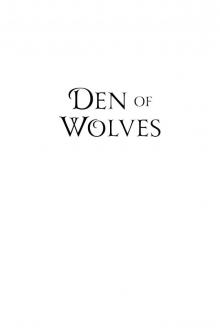 Den of Wolves
Den of Wolves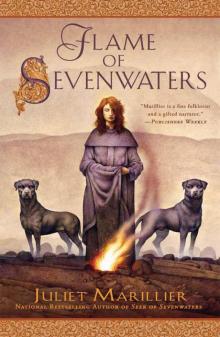 Flame of Sevenwaters
Flame of Sevenwaters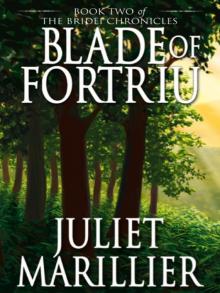 Blade of Fortriu
Blade of Fortriu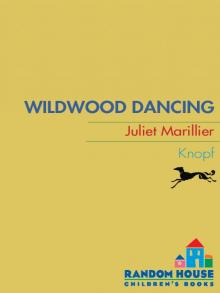 Wildwood Dancing
Wildwood Dancing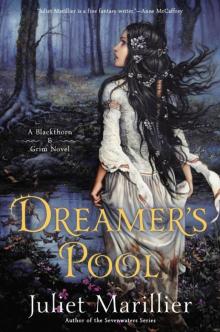 Dreamer's Pool
Dreamer's Pool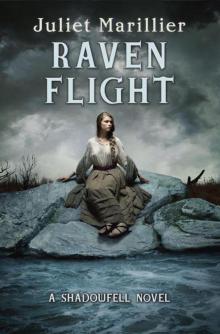 Raven Flight
Raven Flight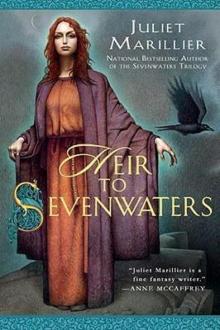 Heir to Sevenwaters
Heir to Sevenwaters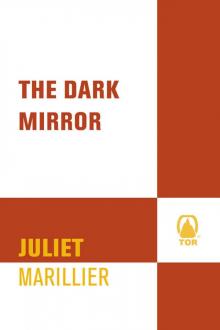 The Dark Mirror
The Dark Mirror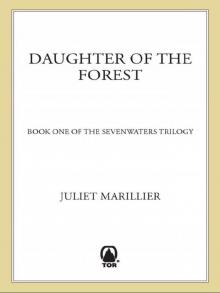 Daughter of the Forest
Daughter of the Forest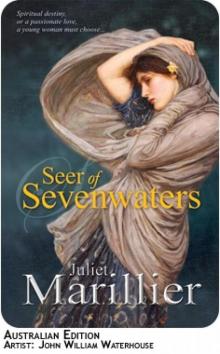 Seer of Sevenwaters
Seer of Sevenwaters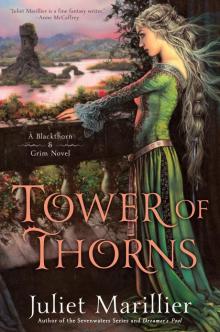 Tower of Thorns
Tower of Thorns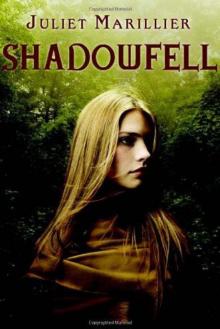 Shadowfell
Shadowfell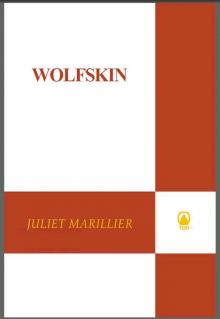 Wolfskin
Wolfskin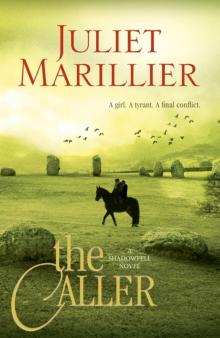 The Caller
The Caller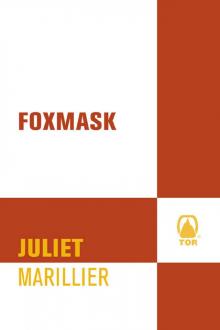 Foxmask
Foxmask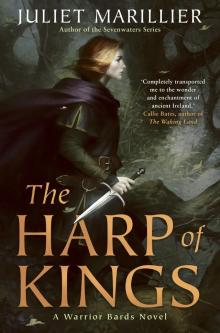 Harp of Kings
Harp of Kings The Well of Shades
The Well of Shades Heart's Blood
Heart's Blood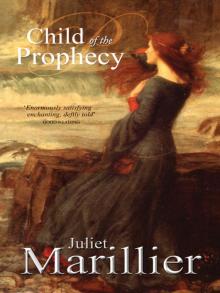 Child of the Prophecy
Child of the Prophecy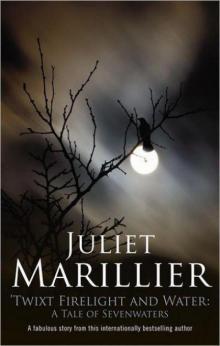 Twixt Firelight and Water
Twixt Firelight and Water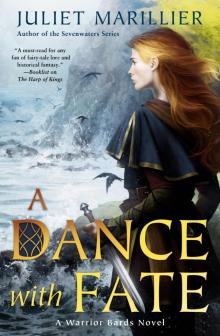 A Dance with Fate
A Dance with Fate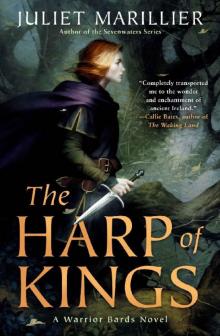 The Harp of Kings (Warrior Bards)
The Harp of Kings (Warrior Bards)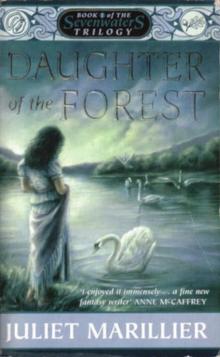 Daughter of the Forest (The Sevenwaters Trilogy)
Daughter of the Forest (The Sevenwaters Trilogy)![Sevenwaters [06] Flame of Sevenwaters Read online](http://i1.bookreadfree.com/i2/04/08/sevenwaters_06_flame_of_sevenwaters_preview.jpg) Sevenwaters [06] Flame of Sevenwaters
Sevenwaters [06] Flame of Sevenwaters![[Sevenwaters 04] Heir to Sevenwaters Read online](http://i1.bookreadfree.com/i2/04/12/sevenwaters_04_heir_to_sevenwaters_preview.jpg) [Sevenwaters 04] Heir to Sevenwaters
[Sevenwaters 04] Heir to Sevenwaters